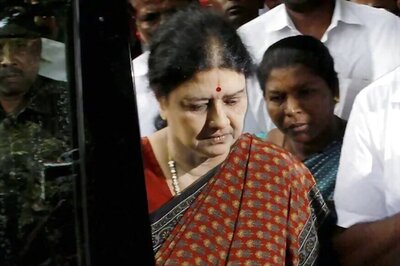
views
A study by Pune-based National Institute of Virology (NIV) suggested that recipients who received a mix of Covishield and Covaxin doses gave better immunogenicity than two doses of the same vaccine.
The study was conducted on 18 people by the ICMR-National Institute of Virology Pune and is yet to be peer-reviewed. The Study compared the safety and immunogenicity profile of the individuals against those who received either Covishield or Covaxin (n=40 in each group).
The finding also suggests that immunization with a combination of two different platforms- an adenovirus vector platform-based vaccine (Covishield) followed by an inactivated whole virus vaccine (Covaxin) was not only safe but also elicited better immunogenicity.
How does it help?
Some scientists say that mixing vaccines could make the fight against Covid-19 stronger as mixing doses of different vaccines results in production of a more potent immune response against Covid-19.
Dr Chandrakant Lahariya, a senior vaccinologist told The Indian Express that mixing vaccines could prove more beneficial in case of viral vector vaccines like Covishield. Dr Lahariya explained that the effectiveness of such vaccines reduces substantially in successive doses as the body starts developing antibodies even against the adenovirus used by the vaccine.
Amid new variants reported across globe, scientists have highlighted that mixing vaccines could develop a wider and broad-range immune response against different mutations of the virus. Some experts have also suggested that mixing vaccines will be beneficial in fighting shortage as the mixing doses could ease the availability.
Mixing and matching not new
Earlier in July, the Subject Expert Committee (SEC) of the Central Drugs Standard Control Organisation (CDSCO) had recommended mixing vaccine doses. It had recommended that permission be granted to Christian Medical College (CMC), Vellore, for conducting a clinical trial on mixing of Covaxin and Covishield, sources told CNN-News18.
However, the government in the parliament, earlier this month, said that national expert bodies have so far made no recommendation on mixing Covid-19 vaccines.
“Covid-19 vaccines have been developed recently. Therefore, scientific evidence about mix and match studies of different vaccines is still evolving,” Minister of state for health Bharati Pravin Pawar gave a written response to Rajya Sabha.
What Indian Experts say?
NITI Aayog member VK Paul had said that mixing vaccine is plausible but there is a need for more studies. “It (vaccine mixing) is plausible. But there need to be more studies… Our experts are also continuously studying…Scientifically, there is no problem.”
AIIMS chief Dr Randeep Guleria seconds the move but have some reservations. He said mixing Covid vaccines is a “definite possibility” but more information is needed before a decision can be taken. He added that though we don’t know which combination is better at this time, but initial studies suggest it may be an option.
The Global view
Mixing two Covid-19 vaccines is not new. German Chancellor Angela Merkel got the Moderna vaccine as her second dose after being inoculated with the AstraZeneca-Oxford vaccine. The German Standing Committee on Vaccination (STIKO) also advised those that got the AstraZeneca vaccine as their first shot, to get a mRNA vaccine as their second, “regardless of their age.”
Canada has also recommended mixing vaccines while Spain has told people to get a mRNA vaccine after an AstraZeneca first dose. In the US, the Food and Drug Administration (FDA) has not yet recommended mixing vaccines.
Side effects?
According to a recent study, mixing doses of two leading Covid-19 vaccines increased patients’ side effects such as fatigue and headaches in early findings.
According to a report by Bloomberg, people who got the first dose of AstraZeneca Plc’s shot followed by Pfizer Inc.’s vaccine four weeks later reported more short-lived side effects, most of them mild, researchers from the University of Oxford reported in The Lancet medical journal. That was also true when the order of the shots was switched.
Dr Sunil Jain, Head of Emergency Medicine, Jaslok Hospital & Research Centre cautions that mixing Pfizer and AstraZeneca could increase the frequency of mild to moderate side effects. However, these symptoms were short-lived and there were no hospitalisations or other safety concerns, Firstpost reported.
Read all the Latest News, Breaking News and Assembly Elections Live Updates here.



















Comments
0 comment